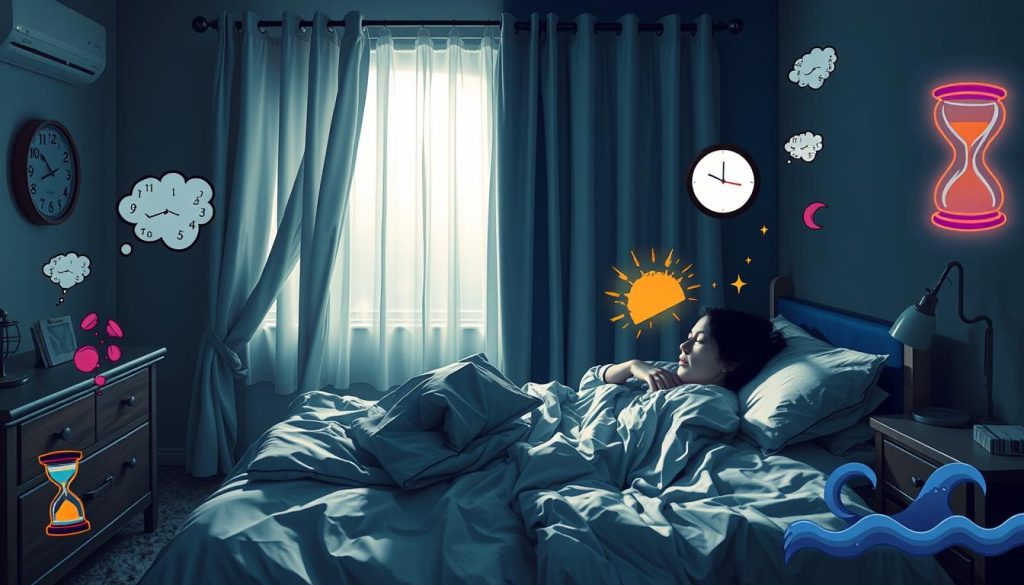Circadian rhythms are key to keeping our body clocks in sync. They control our sleep cycles and hormone levels. For those of us who care about mental wellness, learning about this connection is crucial.
Studies show that any mess with our body clocks can lead to mental health problems. This includes anxiety and depression. By figuring out how to keep our body clocks in sync, we can boost our mental health.
Understanding Circadian Rhythm
Circadian rhythms are key to my health and happiness. They are the changes in my body that follow a 24-hour cycle. These changes are influenced by light and darkness. Knowing about circadian rhythms helps me see why a working biological clock is important for my body’s balance.
Definition and Biological Significance
Circadian rhythms affect many body processes. They control my sleep, eating, hormone release, and cell repair. By keeping my body and mind in sync, they help me stay healthy.
The Science Behind Circadian Rhythms
Science shows that my internal clock is controlled by light. The SCN in my brain is the main controller. When it’s light out, my body stays awake and alert. As it gets dark, my body makes melatonin, helping me sleep.
This light-dark cycle is vital for my mental health. It keeps my circadian rhythm in check.

The Link Between Circadian Rhythm and Mental Health
It’s important to understand how our circadian rhythm affects our mental health. When my rhythm is out of sync, I feel my mood drop. This can lead to mood swings and more anxiety. These issues often come from irregular sleep, late-night light exposure, or non-traditional work hours.
Studies show that these disruptions can raise the risk of anxiety and depression. It’s key to recognize these signs to manage our mental health better.
How Disruptions Impact Mood and Anxiety
Disruptions in my circadian rhythm affect my mood. I notice my mood swings get worse, making it hard to stay positive. People with these disruptions are also more likely to face anxiety disorders.
Spotting these issues is crucial for managing our mental health. It helps us find ways to get back in balance.
The Role of Sleep in Mental Wellness
Quality sleep is vital for my mental health. When I sleep well and in sync with my rhythm, I feel better mentally. Good sleep improves my thinking, mood, and emotional strength.
Without enough sleep, my thinking gets worse, and I feel more anxious. This shows how important a regular sleep schedule is.

| Effects of Circadian Rhythm Disruptions | Mood Swings | Anxiety Disorders |
|---|---|---|
| Irregular Sleep Patterns | Increased irritability and frustration | Higher likelihood of panic attacks |
| Shift Work | Emotional instability and sadness | Increased anxiety levels |
| Exposure to Artificial Light | Difficulty in mood regulation | Heightened feelings of dread and apprehension |
Circadian Rhythm and Mental Health: What to Know
It’s important to understand how circadian rhythm misalignment affects sleep. This issue can lead to serious problems like sleep disorders, obesity, diabetes, and heart disease. It can also harm both physical and mental health.
Consequences of Misalignment
When my circadian rhythm is off, I feel tired all the time. Simple tasks become hard. Sleep disorders make me stressed and anxious. This cycle can make my health worse over time.
Signs Your Circadian Rhythm May Be Off
Spotting signs of circadian rhythm disruption early can help. Here are some signs your body’s clock might need adjusting:
- Chronic fatigue throughout the day
- Frequent insomnia or restless nights
- Inability to concentrate or focus
- Mood swings or irritability
- Increased anxiety levels

Watching for these symptoms helps me take action. It’s a step towards fixing my circadian rhythm and improving my mental health.
| Symptom | Description | Potential Health Consequences |
|---|---|---|
| Chronic Fatigue | Constant tiredness affecting daily functioning | Increased risk of sleep issues and productivity loss |
| Insomnia | Difficulty falling asleep or staying asleep | Higher likelihood of developing sleep disorders |
| Difficult Concentration | Struggles with focus or memory | Potential impact on work or studies |
| Mood Swings | Rapid fluctuations in mood | Increased emotional instability and anxiety |
| Heightened Anxiety | Feelings of unease or worry | Risk of developing anxiety disorders |
Tips for Syncing Your Circadian Rhythm
Improving my well-being started with syncing my circadian rhythm. I began by setting a consistent sleep schedule. Going to bed and waking up at the same time each day helped regulate my internal clock.
Adding sleep hygiene practices also helped. I cut down on screen time before bed and created a calming bedtime routine. These habits reinforced my consistent sleep schedule.
Using natural light is another key strategy. I make sure to get sunlight, especially in the morning. This boosts my alertness and energy, improving my mood and overall health.
Lastly, I’ve added mindfulness and relaxation to my daily routine. Activities like meditation, deep breathing, and yoga reduce stress and anxiety. These practices clear my mind and prepare my body for sleep, making my sleep routine more effective.

